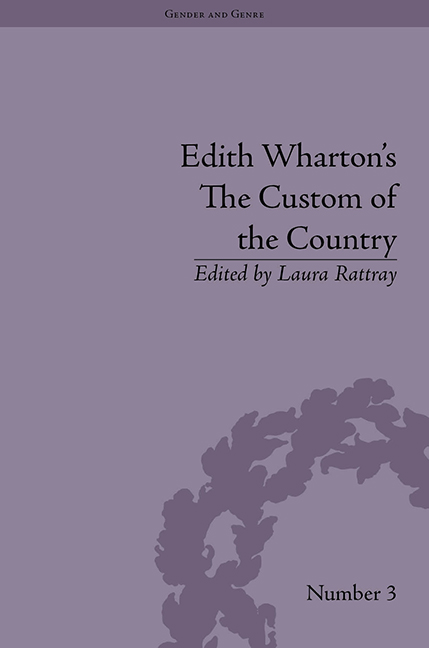Book contents
- Frontmatter
- CONTENTS
- Acknowledgements
- Editorial Note
- List of Contributors
- List of Figures
- Introduction
- 1 The Custom of the Country: Edith Wharton's Conversation with the Atlantic Monthly
- 2 When the Reading Had to Stop: Readers, Reading and the Circulation of Texts in The Custom of the Country
- 3 ‘Don't Cry – it ain't that Kind of a Story’: Wharton's Business of Fiction, 1908–12
- 4 Worst Parents Ever: Cultures of Childhood in The Custom of the Country
- 5 Crude Ascending the Staircase: Undine Spragg and the Armory Show
- 6 ‘It's Better to Watch’: Compulsive Voyeurism in The Custom of the Country and The House of Mirth
- 7 A ‘Mist of Opopanax’: Mapping the Scentscape of The Custom of the Country
- 8 Landscape with the Fall of Undine
- 9 Girls from the Provinces: Wharton's Undine Spragg and Cather's Thea Kronborg
- 10 Men at Work in The Custom of the Country
- 11 ‘Lost in Translation’: Financial Plots and the Modernist Reader in The Custom of the Country
- Notes
- Index
11 - ‘Lost in Translation’: Financial Plots and the Modernist Reader in The Custom of the Country
- Frontmatter
- CONTENTS
- Acknowledgements
- Editorial Note
- List of Contributors
- List of Figures
- Introduction
- 1 The Custom of the Country: Edith Wharton's Conversation with the Atlantic Monthly
- 2 When the Reading Had to Stop: Readers, Reading and the Circulation of Texts in The Custom of the Country
- 3 ‘Don't Cry – it ain't that Kind of a Story’: Wharton's Business of Fiction, 1908–12
- 4 Worst Parents Ever: Cultures of Childhood in The Custom of the Country
- 5 Crude Ascending the Staircase: Undine Spragg and the Armory Show
- 6 ‘It's Better to Watch’: Compulsive Voyeurism in The Custom of the Country and The House of Mirth
- 7 A ‘Mist of Opopanax’: Mapping the Scentscape of The Custom of the Country
- 8 Landscape with the Fall of Undine
- 9 Girls from the Provinces: Wharton's Undine Spragg and Cather's Thea Kronborg
- 10 Men at Work in The Custom of the Country
- 11 ‘Lost in Translation’: Financial Plots and the Modernist Reader in The Custom of the Country
- Notes
- Index
Summary
The writerly text is a perpetual present, upon which no consequent language (which would inevitably make it past) can be superimposed; the writerly text is ourselves writing.
Barthes, S/ZMany intelligent people have no clear idea of what a certificate of stock or a bond really is. And the words ‘money’, ‘stock-exchange’, and ‘finance’ are mere terms they glibly use without knowledge of their meaning.
Lawson, Frenzied Finance‘Absorbed in his theme, and forgetting her inability to follow him, Moffatt launched out on an epic recital of plot and counterplot, and she hung, a new Desdemona, on his conflict with the new anthropophagi’ (p. 537). In this line, late in the novel, Wharton hints at the fact that The Custom of the Country contains another, new story and a new listener, a new Desdemona. In this moment of pivotal closeness between Undine and Moffatt, Undine is both ‘absorbed’ in the ‘theme’ and unable to follow Elmer Moffatt's epic ‘plots and counterplots’. Moffatt, in turn, forgets about her ‘inability’ to follow. And Undine herself is rather unconcerned with this ‘inability’ instead, she simply translates Moffatt's words into her own meaning without paying attention to the story's details:
It was of no consequence that the details and technicalities escaped her: she knew their meaningless syllables stood for success, and what that meant was as clear as day to her.
- Type
- Chapter
- Information
- Edith Wharton's The Custom of the CountryA Reassessment, pp. 157 - 168Publisher: Pickering & ChattoFirst published in: 2014



